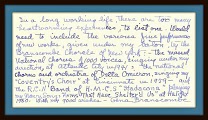Musical America – the
mention of that publication to any classical musician means the holy grail of
the international performing arts scene.
When the annual directory appears at the beginning of the year, artists
from all avenues of the performing arts rush to see what artist management company
their friends and colleagues may have, who ran ads promoting upcoming
performances, what concert series are presenting for their upcoming season,
what new music festivals listed by state and country are available, what music
schools have run ads and much, much more.
It is the Holy Grail!
Today’s editions of the
directory feature “Musician of the Year” photos and an article about that
person. It’s an honor to be chosen for
the cover of Musical America. Recent
honorees have included singer/actor Audra McDonald and conductor Gustavo
Dudamel.
October 8, 1898 marked the debut
of Musical
America published by its founder, John Christian Freund. The original format was a weekly newspaper
for the classical music aficionados featuring articles about conductors,
singers, composers, concerts being presented and interviews with various
artists. Singers, teachers and
instrumentalists would place ads in the magazine to promote upcoming concerts,
their availability for work or their fame as a guru to the great musicians of
the day.
Reaching the one-year mark for
the publication, Mr. Freund took a six year hiatus from the publishing of Musical
America and then returned to publishing the weekly newspaper for
distribution in 1905. For 25 years
musicians, audience members and fans of classical music purchased the paper to stay
up-to-date on what was happening in concert halls and to read about the
featured artist in the informative articles.
By 1921, John Freund began
publishing the Guide which was the forerunner of the present day directory.
Occasionally old issues of the
Musical
America newspaper come up for sale on E-bay or one page of the
publication featuring an artist’s interview with the paper will be sold. One such page came up for sale featuring
Felix Borowski, who taught music theory and composition at the Chicago Musical
College, and who was Gena Branscombe’s teacher.
He was featured in an interview in the June 29, 1912 edition. Mr. Borowski was quoted as saying the future
of American music had to be cultivated in the home. Music was to be performed on the local level
not necessarily in concert halls but in private playing the great masterworks. Maybe this would happen in the era of the
article and until after World War II, yet sadly, I think this rarely happens
now. His perception was right….music
education begins at home.
In the March 28, 1910 edition of the newspaper, Gena Branscombe was featured and a review written about a concert of her works in Berlin. Soprano Belle Forbes performed songs that, “are original and of melodic and dramatic effect.” Also presented was a violin with piano accompaniment piece. What a wonderful boost to her career as she was about to conclude her one year study with Englebert Humperdinck in Germany and return to the United States to continue composing and performing.
The second time Gena was
featured in Musical America was in November 1920 when the publication
praised the composer for the choral arrangements she had written for Arthur P
Schmidt, music publisher. In a
philosophical way Miss Branscombe explained to the interviewer her own musical
beliefs:
“I believe that a beautiful
snatch of melody, even if it happens to be a hymn-tune, may be a richer gift to
the world than a learned symphony. Music
is the most potent force making for spiritual liberation. The musician holds a trust so sacred that he
cannot give expression to the more sinister emotions without in some measure
betraying it. In my younger days I
reveled in gore like most beginners in art.
Then a deep grief came to me, and I learned that I could take no lasting
satisfaction in work which failed to carry a reminder of the highest possible
conception of the destiny of the human race.”
Musical America continues
to promote musicians worldwide. Now on
the internet, on a weekly basis there are interviews and articles about artists,
orchestras, opera companies, and concert halls around the world. Our holy grail continues to inspire.


